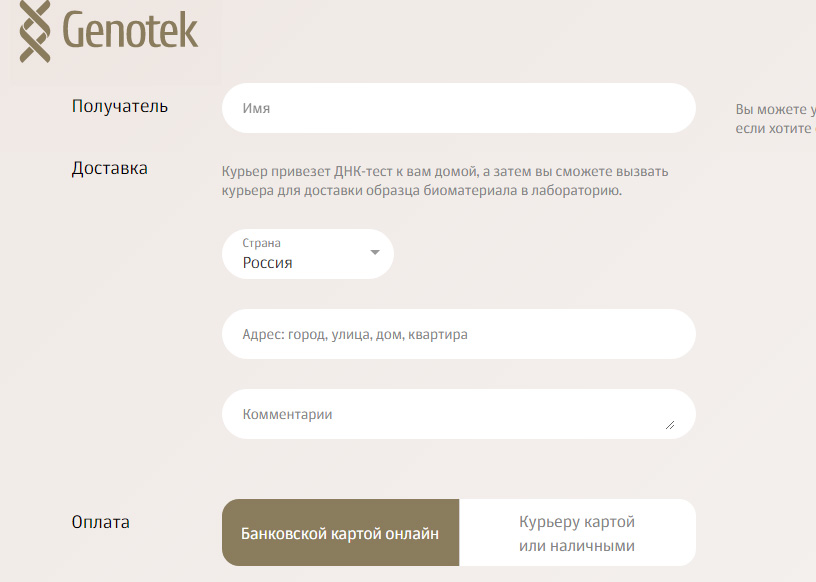
Varieties of DNA tests by delivery method
This question should be puzzled even in the process of choosing a test, but even having understood the general principles, you can miss some of the nuances. Let's try to discuss them below.
Tests can be roughly divided into:
- order in Russia, for rubles, with home delivery ("Genotek" or "Atlas" for example)
- order from abroad, for currency, through your post office ("FamilyTree DNA", "MyHeritage" for example)
- order from abroad, for foreign currency, through an intermediary ("Ancestry", "23andMe" and some others)
Naturally, you must have basic skills in ordering goods on the Internet, and also have a bank card with the ability to pay for orders on the Internet and abroad. If you have poor knowledge of English, then a browser with automatic translation of pages into Russian, for example "Chrome", is also better.
I never tire of recommending to always use a separate bank card for purchases on the Internet, preferably a virtual one, on which money is never constantly deposited, and immediately before the purchase the required amount is transferred and immediately spent. Always assume that card details can potentially go to scammers. Never use a single salary card for online shopping!
Ordering a DNA test in Russia
Everything is simple here and you don't have any headaches, except for the price of the product.
It is even possible to deliver to your home and pay on receipt, and not in advance on the site.

After passing the test, the result can also be sent back to the laboratory by courier. Everything happens quickly and conveniently.
Ordering a DNA test abroad and sending it back
From abroad, ordering a test is also not very different from a simple purchase on the Internet. Provided that this sale is permitted on the territory of Russia. The only negative is the waiting time for the package on the way.

The test will arrive by mail at your Russian Post office, you will take the test, and then you will need to send the test back via mail.
There are laboratories that do not sell tests in Russia. For example, not long ago the MyHeritage laboratory was the largest in the Russian market, but after the efforts of some State Duma deputies, the laboratory stopped selling products to Russia. If you go to their website, then there is simply no section with DNA tests there! And if you are already registered and there are already tests in your personal account, but when you try to order a new one, you will see a message about the ban on sales in Russia.
How do I get around this limitation? Of course it's very simple! Exactly the same as torrents and other resources banned in Russia, everything is fine by simply changing the ip-address through special browser plugins and changing proxies. I will not dwell on this separately, a lot is said about this, the main thing is the result - you can order without problems with the subsequent sending of the result through the "Russian Post". Unless banned altogether, like Ancestry and 23andMe.

Ordering a DNA test in countries that do not sell tests to Russia
If the case with “MyHeritage” is just a formal implementation of Russian laws at the level of ip-addresses, then in the case of a number of other companies they do not sell tests for addresses of the Russian Federation in principle.
On the other hand, nothing prevents a Russian from ordering a test in Europe or America, taking the test and sending it back again from Europe or America. Citizenship is not asked. How can this be done?
The option with a friend, which often happens in Europe, we leave aside. This is the simplest.
We are interested in the option with an intermediary site.
, - . , , , , .
, «» «» «» . ! , – .
There are really a lot of services, I will give just one example of a site that I personally used. It's called “Shipito”. But before ordering a test - google how things are at the moment with the attitude of a particular seller to the mailing addresses of a particular intermediary, tk. sometimes sellers start blocking intermediaries.

After registering on such a site, you get a completely real mailing address and when ordering instead of the address " Russia , Moscow ...", where the seller will prohibit the order and "Russia" you simply cannot choose, you will indicate an address like "3501 Jack Northrop Ave, Suite AOS987, Hawthorne, CA 90250, USA "in its own name.
You make an order to this address, the intermediary receives the parcel and invoices you for shipment to Russia, you pay the invoice and the intermediary sends the parcel to you. Elementary!
For a DNA test, such services will cost about $ 20, but it all depends on the intermediary company, weight, discounts. Detailed instructions on how to register and order through intermediaries on the Internet in abundance, I will not repeat. There are also many intermediary sites.
This way you can order tests from 23andMe or Ancestry. Moreover, if in the case of "23andMe" you have to send the test back to the laboratory through an intermediary, then in the case of "Ancestry" you only need to receive an order, and you can already send the result directly from your branch of the Russian Post, restrictions on the country Ancestry has no sender.

DNA test taking process
Here, in general, everything is elementary, so I will say just a few words. Everything will be described in the instructions for the purchased test.
The classic concept of "giving saliva for a DNA test" is not entirely true. In most cases, when a stick is crawled in your mouth, it is not saliva that is taken, but a microlayer of mucous membrane is scraped off the inside of the cheek. In fact, you scratch your mucous membrane, after which it may even tingle slightly for several minutes.
In some laboratories, for example at Ancestry, saliva is actually given. There is really a cone with a border along which you need to collect saliva, after which a preservative component is added to it and this saliva is sent to the laboratory.
Nuances when sending a DNA test from Russia abroad
As I said, tests are different. There is a stick in the form of a "brush" and after drying this stick is sent back just in a bag. It happens that this same brush-brush is put into a small plastic cone with a special liquid for the preservation of the sample, and these plastic cones are sent back. It happens that a plastic flask is generally sent where you need to collect saliva and send this flask with saliva to the laboratory.
But in any case, you need to send a DNA sample by mail across the Russian border.
When sending a parcel or "small package" across the border, you will need to describe the contents of the parcel for checking at customs, and you will be asked about the contents at the post office upon receipt of the parcel.
Here are the small nuances.
Do not try to say or write that you are sending any DNA samples or biomaterials. This is absolutely pointless and will cause many stupid questions and attempts to "fit" the DNA test into the rules and frameworks of the Russian Post and the RF Law. I will not say anything about stupid questions that you may hear.
Treat sending formally. What are you sending? Plastic sticks or plastic jars. Say so and write without any details. You pack plastic sticks or plastic tubes in a mail bag, sign the address, insert the necessary papers filled out for the laboratory and fill out a customs declaration in the mail.
In this very customs declaration, write formally what you are sending (in Russian or English), for example: "plastic sticks, 2 pcs." or "Plastic tubes, 2pcs" and rate below actual value so you won't be ripped off for shipping charges. You can write down the real cost, in case of loss, but the cost of our mail services will not please you.

Rest assured, everything will reach the laboratory without any problems. There are cases of loss of packages with DNA tests, as with any other packages, but this is rather an exception to the rule. In case of loss, perhaps the laboratory will send you a new test and it will be excruciatingly painful only if you took a sample from someone from relatives living far away.
In the case of plastic sticks that can be sent simply in a paper bag, some are sent in general by regular mail. It's just that if a question comes from the post office, on the topic "why is there an attachment in the letter", they answer that "they have laid a paper letter with chopsticks so as not to wrinkle." Sending a letter does not require filling out a customs declaration and is cheaper than sending a "small package". But personally, I have not tried this option.
In principle, the most difficult thing is over. The test is selected and purchased , sent back, it remains to wait for the results on the laboratory's website and contact the matches to find common ground.